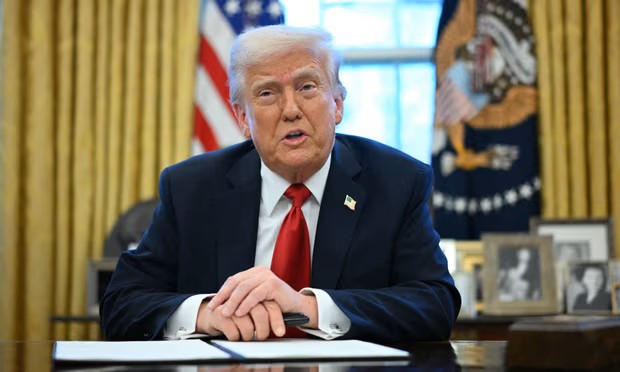Nigeria’s frail economy could be further strained if US President Donald Trump follows through on his recent threat to impose a 10% tariff on BRICS-aligned countries.
According to reports, Trump, who has stepped up his trade rhetoric ahead of the US elections, warned on Sunday via his Truth Social platform that any country that supports BRICS’ “anti-American” policies would face an additional import tax. “There will be no exceptions to this policy,” he announced.
Nigeria formally joined the BRICS in January 2025 and has since taken part in meetings and initiatives organized by the group of rising economies.
President Bola Tinubu arrived in Rio de Janeiro on Saturday for the 17th BRICS Summit, at the invitation of Brazilian President Luiz Inácio Lula da Silva, reaffirming Nigeria’s role as a partner nation in the expanded BRICS framework.
The club, which was originally founded by Brazil, Russia, India, China, and South Africa, has expanded to include six new countries: Egypt, Ethiopia, Iran, Indonesia, Saudi Arabia, and the United Arab Emirates, who will join in 2024.
Though Nigeria’s membership is not yet full status, the country actively participates in high-level talks, policy formulation, and summit pronouncements.
On Sunday, the BRICS nations slammed “indiscriminate” import taxes, warning that they might disrupt the global economy. The group also condemned recent Israeli-US bombings on Iran, which exacerbated relations with Washington.
Read Also: Don’t Be Deceived Again — Ajadi Urges Nigerians to Shun Unfulfilled Promises
It is understood that Nigeria, Africa’s largest economy, continues to rely significantly on crude oil, with petroleum accounting for more than 90% of its exports to the United States.
While Nigeria accounts for a minor portion of the US’s total trade volume, any further tariffs, particularly on non-oil exports, might impede efforts to diversify and slow economic growth.
Since 2023, Nigeria’s economy has struggled with growing inflation, currency volatility, and the consequences from major changes such as the elimination of fuel subsidies and the implementation of a floating exchange rate.
According to the Central Bank of Nigeria (CBN), headline inflation rose from 18.85 percent in 2022 to 34.2 percent in mid-2024, before falling to 27.5% in mid-2025.
Despite the little alleviation, consumer prices remain high, and unemployment casts a pall over prospects for recovery. To keep inflation under control, the CBN’s Monetary Policy Committee has kept interest rates unchanged in recent meetings.
GDP growth has averaged only 2.3% over the last decade, well below the population growth rate, raising concerns about rising poverty and inequality.

